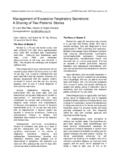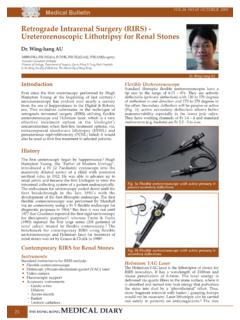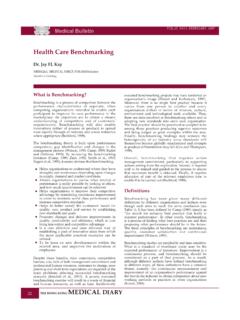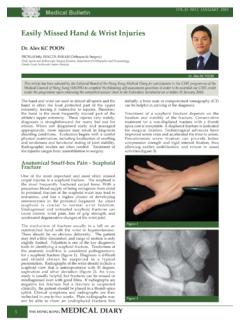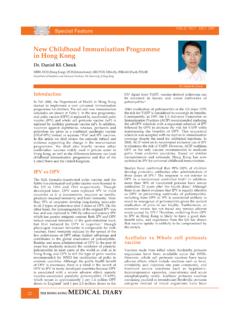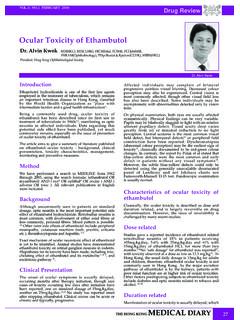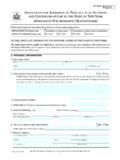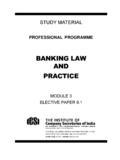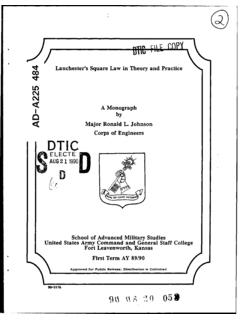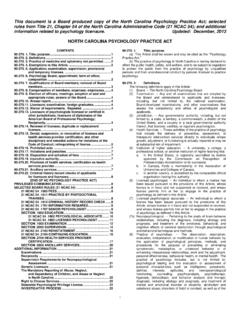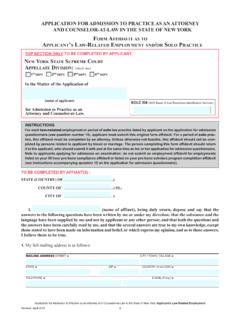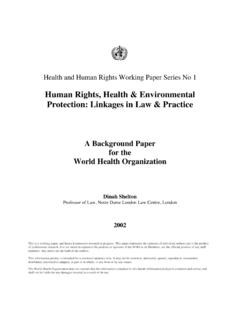Transcription of LAW AND ETHICS IN MEDICAL PRACTICE: AN …
1 3 LAW AND ETHICS IN MEDICAL PRACTICE: AN OVERVIEWDr. HAU Kong-lung, Consultant Forensic Pathologist (Kowloon)Forensic Pathology Service, Department of HealthIntroductionIt is now a firmly established belief that legal and ethicalconsiderations are integral to MEDICAL practice in theplanning for the care of the patient. With the advances inmedical sciences and growing sophistication of the legalframework in modern society as well as increasingawareness of human rights and changing moral principlesof the community at large, doctors and other healthcareworkers alike are now frequently caught in difficultdilemmas in many aspects arising from daily are plenty such as the duty to respect informedconsent, truth-telling, breach of confidentiality, disclosureof MEDICAL errors, rationing of scarce health resources,biomedical research, organ donation, etc.
2 Besides, thereis also growing anxiety both within the MEDICAL professionand in the community regarding increasing trends ofcomplaints and lawsuits against doctors. From the bitterexperience of many doctors who were engaged incomplaint or lawsuits in the past, many of them hadresulted from failing of their doctor-patient communicationskill or inadequate ability to comprehend and resolvedilemmas in clinical ETHICS has developed into a well based disciplinewhich acts as a "bridge" between theoretical bioethicsand the The goal is "to improve the quality ofpatient care by identifying, analysing, and attempting toresolve the ethical problems that arise in practice".2 Inaddition to our moral obligations, doctors are also boundby laws and official regulations which form the legalframework regulating MEDICAL practice.
3 It is now auniversal consensus that legal and ethical considerationsare inherent and inseparable parts of good medicalpractice across the whole spectrum. The disciplines oflaw and ETHICS in MEDICAL practice overlap in many areasand yet each has its unique parameters and distinct and Ethical Regulations of MedicalPractice in HistoryIn ancient Egypt, practice of medicine was subject to legalrestrictions. The right to practise was restricted tomembers of a certain class, and all doctors had to learnand follow the percepts laid down by their , this was to protect the public from for the doctors were paid by the State. Ifunsatisfactory results followed a course of treatment thathad departed from the orthodox, the doctor responsiblewould be liable to punishment, which could be very legal restrictions on MEDICAL practice were alsofound in other early civilizations such as Babylon the history of mankind, MEDICAL legislationhas continuously evolved to regulate the practice ofmedicine.
4 The fundamental objective is to safeguard thestandards of the MEDICAL profession and to protect thepublic against unskilled vendors of medicine who wouldbe as injurious to the community as other criminals. TheJustinian Code of the Byzantine Empire in 529 AD isprobably the earliest law code found to contain clausesto require educational standard and proof of competenceof doctors by examinations. It also restricted the numberof doctors in each town and penalties were imposed formalpractice. By 12th century, there were well establishedmedical legislations in Italy, namely the edict of Roger IIof Sicily in 1140 and Frederick II in 1224, to prescribeorganized MEDICAL teaching, set courses, examinationsand Hong Kong, laws on public health and MEDICAL practice,essentially an adoption of the English Acts, had beenintroduced from the early days.
5 In 1884, the first MedicalRegistration Ordinance was enacted to regulate thepractice of medicine in the territory. Nowadays, the HongKong MEDICAL Council is established and empowered bylaw to perform the following major functions: (a)assessment of qualifications and maintenance of Registerof MEDICAL Practitioners, and registration is the only validlicence to practise medicine; (b) formulating guidelineson the ethical and professional standards; (c) investigationof complaints of professional misconduct; (d) supervisionof MEDICAL education and training; and (e) assessment offitness to practise where a doctor's health is of addition to legal regulation, there were also codes ofmedical ETHICS to guide the doctors for proper earliest code of MEDICAL ETHICS is the "HippocraticOath" originated in Greece in the 5th century BC, whichevolved to regulate the standard of conduct and care by4 MEDICAL SECTIONA ugust 2003the MEDICAL profession at that Indeed, the spirit ofthis 25-century old Oath was restated in the Declarationof Geneva by the World MEDICAL Association in 1948.
6 TheDeclaration is the basis of the modern version of theInternational Code of MEDICAL ETHICS , which was firstformulated by the World MEDICAL Association in 1949 withsubsequent amendments by the World MEDICAL Assemblyin 1968 and 1983 in Sydney and Venice of Law and MEDICAL ETHICS in aNutshellIn its simplest context, law can be defined as enforcedrules devised by the State to govern the behaviour of itsmembers for the mutual benefits of all. Observance ofthe rules must be guaranteed by some kinds of sanctiondirected against the rule breakers. In addition to laws forthe general public, doctors are bounded by certain specificrules stipulated in statutes as well as code of professionalconduct laid down by the official regulating authority,namely the MEDICAL Council, and administrative codesset by the institutions.
7 Together, they form the legalframework regarding the practice of medicine, violationof which may lead to criminal or civil liability, or addition to legal obligations, there are also expectationsof society for the doctors and the goal of the professionbased on long established moral principles of self-evidentvalue, which define the moral framework of medicalpractice. MEDICAL ETHICS can be defined as a self-imposedcode of conduct accepted voluntarily within the medicalprofession, the observance of which depends on one'sconscience and moral and MEDICAL ETHICS are both dynamic and are in aconstant state of change with time due to changingcircumstances and societal values.
8 Thus, new legislationand court decisions give rise to changes of the law andnew ethical issues emerge in response to challengescreated by new technology, law or other influence. Thereis also wide difference in law from country to countrybecause of factors regarding religion, culture, traditions,political systems and social Principles in MEDICAL Ethics5 MEDICAL ETHICS is an applied ETHICS which involvesexamining specific controversial issues such as abortion,breach of confidentiality, end-of-life care, rationing ofscarce MEDICAL resources. The objective is to try to identifythe issue concerned, analyze it with reasoned ideas andarguments and arrive at a viable and morally acceptableresolution for it.
9 In the realm of MEDICAL practice, it isdifficult to hold rules or principles that are absolute inview of the many variables that exist in the context ofclinical cases as well as new issues that arise as a resultof changing circumstances and belief. Nevertheless, overthe years, there are certain fundamental principles thathave won a general acceptance as guideposts in themoral analysis of ethical dilemmas in medicine. Thefundamental principles that apply generally to medicineor health care at large are: (a) respect of patient'sautonomy; (b) the principle of nonmaleficence, , theduty to avoid harm or injury to patients; (c) the principleof beneficence, , the duty to do good to your patients,relieve their pain and suffering and to save life if you can;and (d) the principle of justice and act values that encompass the four fundamentalprinciples in MEDICAL ETHICS are self-evident.
10 They areconsidered to be doctor's prima facie duties to the patientsand society. It is necessary for a doctor to take all of theminto account when they are applicable to the clinical caseunder consideration. Not infrequently, when two or moreprinciples apply, they may be in conflict. For instance,the decision to operate on a case of acute appendicitisinvolves at least two competing prima facie duties on thepart of the doctor. At one end, the doctor is obliged toprovide the greatest benefit to the patient by performingan immediate appendectomy. At the other end, surgeryand general anesthesia carry risks and the doctor is underthe obligation to avoid causing harm to the patient.

